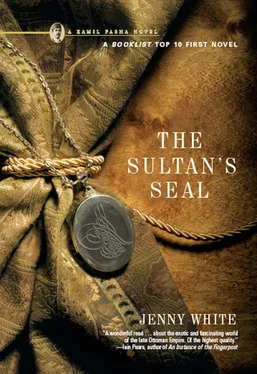Jenny White - The Sultan's seal
Здесь есть возможность читать онлайн «Jenny White - The Sultan's seal» весь текст электронной книги совершенно бесплатно (целиком полную версию без сокращений). В некоторых случаях можно слушать аудио, скачать через торрент в формате fb2 и присутствует краткое содержание. Жанр: Исторический детектив, на английском языке. Описание произведения, (предисловие) а так же отзывы посетителей доступны на портале библиотеки ЛибКат.
- Название:The Sultan's seal
- Автор:
- Жанр:
- Год:неизвестен
- ISBN:нет данных
- Рейтинг книги:5 / 5. Голосов: 1
-
Избранное:Добавить в избранное
- Отзывы:
-
Ваша оценка:
- 100
- 1
- 2
- 3
- 4
- 5
The Sultan's seal: краткое содержание, описание и аннотация
Предлагаем к чтению аннотацию, описание, краткое содержание или предисловие (зависит от того, что написал сам автор книги «The Sultan's seal»). Если вы не нашли необходимую информацию о книге — напишите в комментариях, мы постараемся отыскать её.
The Sultan's seal — читать онлайн бесплатно полную книгу (весь текст) целиком
Ниже представлен текст книги, разбитый по страницам. Система сохранения места последней прочитанной страницы, позволяет с удобством читать онлайн бесплатно книгу «The Sultan's seal», без необходимости каждый раз заново искать на чём Вы остановились. Поставьте закладку, и сможете в любой момент перейти на страницу, на которой закончили чтение.
Интервал:
Закладка:
“Yes, perhaps you’re right.” He is intrigued by the discussion and finds himself oddly at peace. She is standing by his left elbow, turned to face him. Their hands on the rail are almost touching. I could stand here forever, he thinks. He looks at her closely in the light spilling from the room behind them. Large, guileless eyes in an earnest face, plump neck, the pearl nestling in the indentation at its base, a faint lilac scent. Her hair is coiled loosely at the back of her head, tendrils escaping around her forehead and ears. He senses pressure behind the cloth stretched across her bosom, a will to expand toward him. As he looks, he sees Sybil’s cheeks warm. The pearl stands out like a full moon against her flushed skin. Gerdanlouk, he thinks. An evocative Turkish word, with Arabic roots. It means jewelry, but only jewelry adorning a woman between her lower neck and the top of her breasts. Gerdanlouk. He looks away.
Kamil lingers on the balcony, looking out toward the darker space beyond the trees, hoping the chill, bracing air will cleanse his mind of distractions. The distant pinpoint lights above the mosques waver and wink in the wind, marking the end of Ramadan. A new season, he thinks, a new moon. People cleansed by a month of fasting. Maybe that’s a good thing, to be able to start over every year, fresh as a newborn. Free of sin and vices, the Christians would say. For Muslims, who have no concept of sin, reform means to readjust one’s behavior so that it is impeccable in the eyes of others. It’s never too late for that. What others don’t see, well, that’s another story.
He turns abruptly and enters the room. A moment later, Sybil follows him. Neither looks at the other’s face in the appalling light.
Early the following morning, Kamil rides to his sister Feride’s house. One morning every week, he visits his sister and her twin daughters, Alev and Yasemin-aptly named Flame and Jasmine, the one restless and inquisitive, the other amiably tranquil. They breakfast together. Sometimes they are joined by Kamil’s father, Alp Pasha, who lives in a separate wing of Feride’s mansion. Kamil avoids coming at times when he would encounter his brother-in-law at home. He does not like Huseyin Bey, a distant cousin and a minor member of the imperial family. To Kamil’s mind, his brother-in-law is a palace loyalist, but more crucially, an opinionated and self-centered man.
Kamil senses that, despite her large house filled with servants and children and a constant round of visiting, his sister is lonely. For Feride, social life is a desperate, well-oiled mechanism.
Commotion alienates the heart, he muses. It’s easier to be at peace when the world has retreated to an observable distance. But he knows Feride doesn’t understand this and wouldn’t believe him if he tried to explain it to her. As a girl, she desperately wanted to go on social outings and visits, yet when she returned, he remembers her face as wistful and bewildered. She rarely brought friends to the villa. He thought at the time that she was ashamed of living in such an unfashionable house, but now thinks she was lonely even then. The difference between them is that he relishes his solitude, while Feride fights it with continual activity. He spears a piece of melon from his plate and chews slowly, watching Alev try to squirm out of her mother’s grip as Feride reties the satin bow at the back of her dress and then tells her to sit at the table next to her sister.
His father sits at the head of the table, gaunt and bowed over his untouched food. His lips and fingers are stained brown. Kamil can see the naked scalp through his father’s thinning hair, a sight that pierces him with regret. Kamil tries to get his father to look up, so that he can see his eyes. Regret gives way to anger. Alp Pasha does not look up or respond to his son’s attempts to draw him out. Alev and Yasemin also are unusually silent, their eyes drawn inexorably to the shadowy figure hunched beside them. Feride continues chatting amiably, as if she were in full command of her audience.
“When are we going to find you a bride?” she asks with a teasing smile. “The other day, I visited Jelaleddin Bey’s household. His daughter is lovely, educated, and of the right age. She is as beautiful as a rose. Don’t wait too long or another family will pluck her from under your nose.”
Kamil circles his palm in the air to signal exasperation, but he is smiling. This is an old game between them.
“A well-run marriage will bring you back to us.” She looks at her silent daughters and gaunt father. “If you were married, we would all go on outings together with our new sister-in-law. Wouldn’t that be fun, girls?” Feride has two sisters-in-law, her husband Huseyin’s formidable sisters, but they are not the friends she seeks. The two women jealously guard their brother’s interests against any encroachment by his wife.
“Yes, Mama,” Kamil’s nieces answer in unison.
His father heaves himself to his feet and, with unseeing eyes, moves toward the door. A servant shadows him, in case he should fall.
Feride looks meaningfully at Kamil, but he doesn’t meet her eye. He fights down the anger his father’s rejection always evokes in him. It is an unworthy feeling that he tries to hide from Feride.
Kamil uses his bread to capture a piece of goat cheese from his plate and glances surreptitiously at his sister, who is helping the girls finish their breakfast. He wonders how, despite all her duties and worries, she always manages to look so calm, her hair sleeked back under an intricate cloth cap festooned with ropes of tiny pearls, her gown pressed, her hands resting quietly in her lap or working efficiently at some task. Her long, pale face, with its straight nose and thin lips, is not conventionally pretty, but has a seriousness about it, a peaceful radiance that is attractive. Has this life made her content?
It is a contentment that can kill, he thinks. Always forgiving the gentle violence done to one’s time and aspirations. Making minutes into hours and days into years, when there is so much to be done. He does not want to pour his life into a leaky hourglass.
There is no concept of time in the Orient, he thinks grimly. Time is when you marry and have children, then your children marry and have children of their own. That is how lives are reckoned. Between those markers, people sit in the shade, drink tea with their fellows, and make their neighbors’ hills into mountains or cause mischief.
He prefers to measure his time and calculate what can be done with it minute by minute. His hand automatically finds the pocket watch his mother had given him before he went away for his year at Cambridge. He strokes it absentmindedly.
When the girls have finished eating, they run off. Feride and Kamil move to the sitting room. Feride closes the door.
“I don’t know what to do,” she whispers anxiously. “You saw Baba just now. It has become unbearable. He rarely speaks and never leaves the house. All he does is sit in his quarters smoking his pipe. Not only does he refuse to speak with Alev and Yasemin, now he avoids them in the house. When I asked him about it, he claimed that they’re of an age where it’s inappropriate for them to be in the same room with an older man. He wants them to cover their hair!”
“But they’re only children.”
“I know. It’s ridiculous,” Feride says crossly. Two vertical lines between her eyebrows spoil her otherwise smooth face. “He’s their grandfather, after all. No rules forbid him seeing them. The girls love their grandfather. He used to play with them when they were younger. Now they think they’ve displeased him somehow.
Kamil has a sudden insight. “You know, Feride, the girls are beginning to look just like their grandmother, with that reddish hair and freckles. And their voices, especially Alev. Do you remember how you once described Mama’s voice, like doves cooing? Maybe Baba can’t bear to be reminded,” he suggests.
Читать дальшеИнтервал:
Закладка:
Похожие книги на «The Sultan's seal»
Представляем Вашему вниманию похожие книги на «The Sultan's seal» списком для выбора. Мы отобрали схожую по названию и смыслу литературу в надежде предоставить читателям больше вариантов отыскать новые, интересные, ещё непрочитанные произведения.
Обсуждение, отзывы о книге «The Sultan's seal» и просто собственные мнения читателей. Оставьте ваши комментарии, напишите, что Вы думаете о произведении, его смысле или главных героях. Укажите что конкретно понравилось, а что нет, и почему Вы так считаете.












